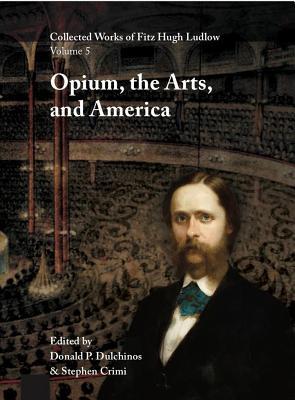Fitz Hugh Ludlow's non-fction essays, travelogues and criticism ranged as widely in subject matter as he did in his geographic travels to the southern and the western edges of the United States. His sketches of Florida provide a view of pre-Civil War slaves and slave-owners, as well as an early view of Florida as a haven for invalids and the elderly. His theatre and musical criticism highlight early stars of the New York stage, including Edwin Booth (brother of John Wilkes Booth), and of New York concert performances including Creole pianist and composer Louis Gottschalk. At the end of his career, he returned to the subject of drugs in a very different vein, as both a student and a sufferer of the opium habit. Ludlow burst on the literary scene in 1857 with the unlikely best seller The Hasheesh Eater. Written when he was just 20 years old, the book swept him into a career as a prolifc novelist, short story author, arts critic, travel writer, journalist and editor. His friends and colleagues ranged from Walt Whitman to Brigham Young to Mark Twain. The material published in Ludlow's Collected Works displays a depth of observation, a breadth of erudition and an appetite for extreme experience applied to the emerging modern American nation.

Collected Works of Fitz Hugh Ludlow, Volume 5: Opium, the Arts, and America
Fitz Hugh Ludlow's non-fction essays, travelogues and criticism ranged as widely in subject matter as he did in his geographic travels to the southern and the western edges of the United States. His sketches of Florida provide a view of pre-Civil War slaves and slave-owners, as well as an early view of Florida as a haven for invalids and the elderly. His theatre and musical criticism highlight early stars of the New York stage, including Edwin Booth (brother of John Wilkes Booth), and of New York concert performances including Creole pianist and composer Louis Gottschalk. At the end of his career, he returned to the subject of drugs in a very different vein, as both a student and a sufferer of the opium habit. Ludlow burst on the literary scene in 1857 with the unlikely best seller The Hasheesh Eater. Written when he was just 20 years old, the book swept him into a career as a prolifc novelist, short story author, arts critic, travel writer, journalist and editor. His friends and colleagues ranged from Walt Whitman to Brigham Young to Mark Twain. The material published in Ludlow's Collected Works displays a depth of observation, a breadth of erudition and an appetite for extreme experience applied to the emerging modern American nation.